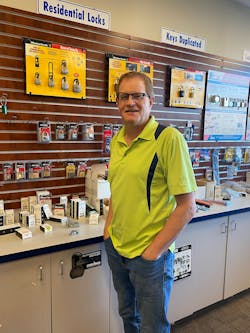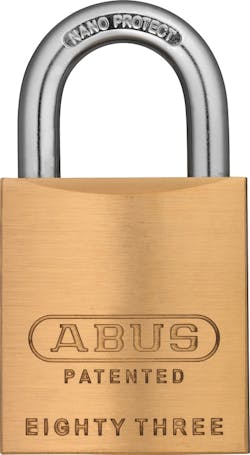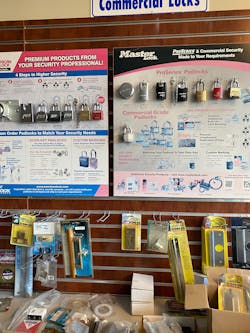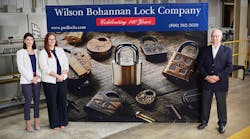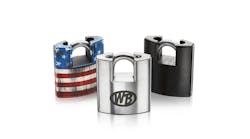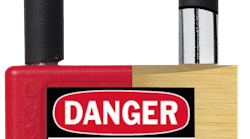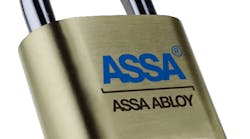Padlocks are one of the main products in a locksmith’s security lineup. Padlocks of all types, including smart electronic models, are a primary point-of-purchase offering for customers who visit a lockshop. They also are a part of a security plan, particularly at remote locations.
Valley Forge Security Center in King of Prussia, Pennsylvania, was one of my first customers back in 1993. It opened in 1991. Bob Cook is the owner, and his brother, Steve, manages things and does most of the product ordering.
Steve Cook and I recently spoke about how Valley Forge makes use of padlocks in various situations and how that’s evolved over the years.
Locksmith Ledger: As a salesperson for a couple of suppliers for the past 29 years, I look at the variety of padlocks available. It would seem that you can do much more now with padlocks, because the padlock key doesn’t have to be separate from the rest of the security system being used, correct?
Steve Cook: That’s a good point. The first ones I recall [that allowed that] were the ABUS 83/45 and the Master 6840 series brass padlocks that accepted the Lori type cylinder. That gave us the opportunity to upsell the customer. Now, they could incorporate the padlock key into the rest of the system. You’re taking keys off their big key ring.
Cook: The ones I brought up are what I’m most familiar with — the ABUS and Master brass body ones. We recently tried a less expensive import version of the 83/45, and, unfortunately, they didn’t hold up as well. I tried them because the ABUS locks kept increasing in price.
LL: How do you choose? Let’s say you want to use Schlage’s SC1 keyway. How do you decide on the padlock?
Cook: It used to always come down to price, but with padlocks, it comes down to reliability first. The Schlage Kryptonite padlock is an option, but they’re a more expensive choice. For me, it always comes back to ABUS. I’d rather not have anyone call me because their padlock failed.
Master’s brass body and Pro Series locks are pretty versatile, but once in a while, there’s a hiccup in terms of reliability. Maybe someone at the factory had a bad day and wasn’t paying attention. Master’s gotten rid of some [models] recently, and this could be a problem. A construction company’s been using the same padlock for 20 years on their job boxes, and all of a sudden, I can’t get these locks anymore!
LL: What do you do in this case?
Cook: We go to another padlock, but some replacements aren’t always able to be keyed to the existing system. I’m not sure why this decision was made. I will say Master’s tech support and customer service have improved when you call, so that’s a good thing.
LL: Have you run into situations where you couldn’t come up with a padlock that could be used with an existing commercial system?
Cook: When the keyway requested is unavailable. ABUS offers the popular ones, and there’s an 83/45 KNK (key-in-knob) that will accept a Lori type cylinder. If you’re dealing with a more obscure Yale or Corbin keyway, for example, then you have to go with the original manufacturer, and they tend to be more expensive.
LL: So, reliability, cost and versatility seem to be the primary factors when you choose which padlock to use. Generally speaking, can you do much more these days than before?
Cook: Yes, it’s been helpful and profitable. It’s part of the upsell now. We went to a home recently to help with padlocks for the front gate as well as rekeying the front door. We let [the owner] know she could have one key for everything. She was very happy to know that in the future, new padlocks wouldn’t necessarily be required, because the padlocks are rekeyable.
LL: What about electronic padlocks? Have you been able to incorporate them into access control jobs?
Cook: There are no padlocks I’m aware of that we can use and treat like an access point or like a reader of some kind. It would have to be wireless, and I’d have to have a PIM or something above the ceiling to receive the signal and send the signal back to the panel. The padlock itself, like the reader in a system, has to be the right format.
For example, we use [dormakaba] Keyscan for much of our access jobs. There’s no padlock that could house that type of formatted reader, operates on batteries and has to send a signal wirelessly. There has to be a lot going on in that padlock to accomplish that.
We have used the Medeco CLIQ system off-site. Let’s say it’s a utility company that has a site in the middle of nowhere. The user uses their key that has the electronics in the head. If someone wants to do an audit trail, they’d bring the key to the laptop to read the information. There’s a lot of them being used that way.
LL: So, in this case the padlock isn’t electronic, but the cylinder communicates with the key, which then is read at the laptop. You can treat it like any other access control system?
Cook: Just like a car key that has a transponder. The cut key will go in and turn, but the car still won’t start.
The one issue we’ve had with high-end padlocks that might or might not include electronics is that the poor padlock, for all its benefits and hard work, is treated terribly. The poor lock gets lost, run over, whacked. The padlock would like a little lubrication once in a while.
LL: So, the padlock typically is treated as something separate from the rest of the system — an off-site afterthought?
Cook: By its nature, a padlock hangs on a hasp happily. Take it off without being attached to a chain, and who knows what might happen to it? I always hesitate to upsell high-end padlocks for that reason. I always try to upsell a chain with any padlock: Take [the padlock] off, and it won’t go anywhere.
LL: On the one hand, you don’t want customers associating Valley Forge Security with things that go wrong, but on the other hand, you’re a business that wants to maximize sales and profits.
Cook: I’ll upsell and would love to sell you a $500 padlock, but I don’t want you yelling at me days or months down the road, asking why I sold this to you.
If I sell you a Master 175 [numbers dialed at the base of the lock], I’ll tell you to write down the combination and keep it in a safe place. [Customers] come back later and say they set it properly but can’t remember what they set it to.
LL: Do customers come to you with ideas about how a padlock could be a solution to a problem, or are you more likely to suggest it?
LL: Do you get involved in jobs where large numbers of padlocks are requested keyed-alike? I always wonder why that’s requested when a lost or stolen key would deny someone access to so many locks.
Cook: I used to get a certain lock for a construction company that had a restricted key. I’ve sold them hundreds of padlocks, and people will come in with a key to have duplicated, and I recognize it as the key to these locks. Or maybe they come in with a padlock and key they found on the ground or at a garage sale. I have to explain each time that I can’t make that key for them, because [the customers] aren’t authorized.
I have several accounts that have hundreds of padlocks scattered throughout the city. Take the trash company that has all of its containers using the same keyed-alike padlock: If a key gets out, is someone going to be going around opening dumpsters? In some cases, it makes sense.
Restricted padlock keys are generally different from something like [Schlage] Primus or Medeco, because there are typically many of them out there, and the padlocks are scattered all over the place. If someone finds a key or takes it off someone’s ring, they have no idea where most of the padlocks are. It’s not like you found the masterkey to a building and now have access to everything.
LL: What would you like to see changed or offered in the padlock world that doesn’t exist?
Cook: More versatility. Too often we’re limited because of the shackle size. It’s not wide or long enough or just doesn’t work in some applications. I haven’t found a padlock that fits properly on refrigerator handles, for example.
Steve Kaufman has worked for distributors in the locksmith industry since 1993 and worked as a full-time locksmith from 1978 through the 1980s. Kaufman is the sales manager for IDN Hardware out of its Philadelphia location.
